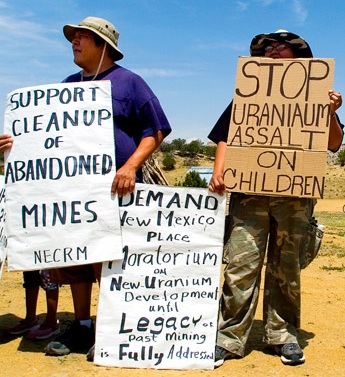
- Details
- By Press Releases
WINDOW ROCK, Ariz.— The Office of the Speaker is announcing public hearings on the impacts of uranium ore mining, transport, processing and related activities on Navajo lands throughout the month of March 2020.
The Naabik’íyáti’ Committee of the 24th Navajo Nation Council invites the public to participate in any of four uranium public hearings on:
- Mar. 5, 2020 at Diné College South Campus, Shiprock, N.M. at 9:00 AM;
- Mar. 6, 2020 at Navajo Technical University, Crownpoint, N.M. at 9:00 AM;
- Mar. 13, 2020 at Chinle Community Center, Chinle, AZ at 9:00 AM;
- Mar. 14, 2020 at Tuba City, AZ (location to be announced) at 9:00 AM.
“Addressing uranium clean-up is, first and foremost, one of the highest priorities of the 24th Navajo Nation Council. We invite the Navajo public to attend these uranium public forums to voice their stories and experiences. Our Nation’s position and policies will be shaped directly by the things our People share about the legacy of uranium mining across Navajo land,” said Speaker of the Navajo Nation Seth Damon.
“When it comes to the legacy of uranium, the Council’s work in seeking justice, both for our People and our environment, never ends. There isn’t a single council delegate that is not impacted, and the People should know we’re always fighting for them,” said Council Delegate Amber Kanazbah Crotty.
During a 3-hour 7:00 AM leadership meeting Feb. 13 between council delegates and the Navajo Nation Environmental Protection Agency, the 24th Navajo Nation Council stressed the importance of continuing to build a strong and accountable uranium clean-up program. NNEPA Executive Director Oliver Whaley stated that the agency need’s the Council’s support to continue the expansion of its abandoned uranium mine lands clean-up work.
524 former uranium mines have been identified on or immediately surrounding the Navajo Nation. 219 mines are being addressed through the “polluter pays” principle in the Comprehensive Environmental Response, Compensation and Liability Act (CERCLA), also called the Superfund law. Director Whaley reported to the Council that clean-up of all identified sites would require at least $2-4 billion.
“To accomplish the great task of moving uranium clean-up projects forward, we are holding these uranium public hearings to reestablish the immediate need for long overdue support,” said Speaker Damon.
Over the past three weeks, Office of the Speaker staff have facilitated a series of coordination meetings between multiple agency and program leaders and the Diné Uranium Remediation Advisory Board. Through consultation with each program, staff are developing a legislative approach to push for greater federal support for clean-up projects.
In Sept. 2020, President Jonathan Nez and Vice President Myron Lizer approved the Office of the Speaker’s request in the Navajo Nation Fiscal Year 2020 Comprehensive Budget for a Radiation Exposure Compensation Act (RECA) lobbyist. With assistance from Council Delegate Amber Kanazbah Crotty and the Navajo Uranium Radiation Victims Committee, the Office of the Speaker finalized the selection of the federal lobbyist this week.
“The most important thing is the voices of the Navajo People. Council is moving forward with these uranium public hearings because it’s not just elected leaders that need to hear this, but federal administrators in Washington need to hear it, too,” said Council Delegate Kee Allen Begay, Jr.
Under three separate legislation in 2019, each sponsored by Delegate Begay, the 24th Navajo Nation Council consistently discussed measures to build the Navajo Nation’s capacity to address abandoned uranium mine lands directly. On Feb. 6, Delegate Begay delivered a report to the Diné Uranium Remediation Advisory Commission at the Kayenta Township and shared the Council’s work to bring the United State Environmental Protection Agency administration into the discussion. The USEPA administers grant and settlement funding to the NNEPA for a portion of uranium mine clean-up activities. On Jan. 9, council delegates met with USEPA administrators in Washington, D.C. to promote greater collaboration between the Navajo Nation and the federal agency beyond the regional USEPA offices.
In response, the USEPA Region 9 office will meet with council delegates to begin government-to-government consultation on its long-term plans and priorities.
Through the uranium public hearings, the 24th Navajo Nation Council will continue its work in creating a concise uranium clean-up position and policy statement that will lead the Nation’s remediation funding efforts.
For more information on the uranium public hearings, contact the Office of the Speaker at phone number (928) 871-7160. Written comments may be mailed to: Naabi’íyáti’ Committee C/O Tom Platero, P.O. Box 3390, Window Rock, AZ 86515. Comments may alternatively be emailed to: comments@navajo-nsn.gov. Anonymous comments will not be accepted.
More Stories Like This
Native News Weekly (August 25, 2024): D.C. BriefsNavajo Nation Mourns the Passing of Former Vice President Rex Lee Jim
Deb Haaland Earns Endorsement From Communications Workers of America Local 7076
University Soccer Standout Leads by Example
Two Native Americans Named to Democratic Congressional Campaign Committee's“Red to Blue” Program
Help us defend tribal sovereignty.
At Native News Online, our mission is rooted in telling the stories that strengthen sovereignty and uplift Indigenous voices — not just at year’s end, but every single day.
Because of your generosity last year, we were able to keep our reporters on the ground in tribal communities, at national gatherings and in the halls of Congress — covering the issues that matter most to Indian Country: sovereignty, culture, education, health and economic opportunity.
That support sustained us through a tough year in 2025. Now, as we look to the year ahead, we need your help right now to ensure warrior journalism remains strong — reporting that defends tribal sovereignty, amplifies Native truth, and holds power accountable.
 The stakes couldn't be higher. Your support keeps Native voices heard, Native stories told and Native sovereignty defended.
The stakes couldn't be higher. Your support keeps Native voices heard, Native stories told and Native sovereignty defended.
Stand with Warrior Journalism today.
Levi Rickert (Potawatomi), Editor & Publisher
